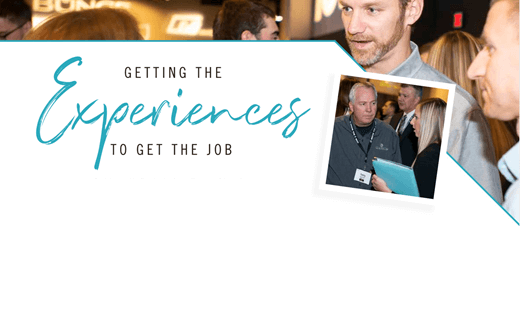- Candidates
- Login
- Set Up Account
- Create a Job Alert
- Search Tools
- Resources
- Employers

Getting the Experiences to Get the Job
YOU WENT TO COLLEGE to pursue a degree, but more than that, to pursue a career. Yet, you probably know employers want to see more. If you’re applying for a position that requires a degree, everyone you are competing against will also have a degree, says Nick Koewler from the Land O’Lakes talent acquisition team.
“It’s what you have in addition to the degree that is important as we look at what qualifies candidates as top talent,” he said. Koewler added while you need technical skills, it is how you work in a team setting with both in-person and with virtual customers and colleagues that will make you and your future employer successful.
Employers want to see you have pursued experiences that help position you as a well-rounded, attractive candidate, says Justin Margherio, Senior Recruiter for Bayer U.S. “From our end, it’s the combination of an individual’s education and their extracurricular experiences,” he said. “You have to be able to show that you have some kind of experience applying your degree outside the classroom.”

So which entries on your resume will help you stand out? While every job, company, and recruiter might be looking for something slightly different, here are five pieces of advice to help you get started.
1. WORK EXPERIENCE
The first thing most recruiters and hiring managers look for is work experience that relates to the position. Sometimes it might feel like you have to have had an internship to get an internship. Margan Mulvaney, Executive Director of Human Resources for Merck Animal Health, encourages students to think beyond the standard internship when they are looking for their first work experiences. “What we’re looking for is any relevant experience, whether it be paid or volunteer, where you have had exposure to different parts of the business,” she said. “We want to see that you have had an experience where you can relate to working in a particular field or line of work.”
Another opportunity Tracie Gogolin, Vice President of People and Culture for Agribusiness at Wilbur-Ellis, suggests is taking time your freshman year to shadow at least two people working in the career you’re interested in. “Taking time to do this early in your education will help you make sure this is your passion and the right path for you,” she says.
2. PEER LEADERSHIP
After an internship or work experience, the next best way to show you are pursuing relevant skills is through on-campus peer leadership. In the workplace, you will have opportunities to lead with influence as you manage projects among groups of your peers as well as your superiors. “Get involved in those organizations and take those leadership opportunities as early as you can,” says Margherio. “That’s a skill we look for. Can you lead your peers through projects?”
Mulvaney adds that leadership also extends beyond internships and club officer roles. “It doesn’t have to be an officer role,” she says. “You can show that you have exposure to leading project teams though your studies or leading a volunteering effort.”
In addition to peer leadership, Koewler adds that club participation helps recruiters get a better picture of you as a candidate. “Student club participation is great,” he says. “Seeing that helps us as recruiters understand a little bit more about the person, what they like to do and in what type of situation they will thrive.” Experiences
3. EXPERIENCES THAT STRETCH YOU
Many people will tell you that the greatest growth comes from situations that stretch you beyond your comfort zone. Recruiters are looking for proof you’ve embraced and learned from experiences like this. “I like to see experiences that have made you uncomfortable,” says Koewler. “Those experiences are about rounding out what you have done, working with other people and problem solving.”
Sometimes the type of stretch experience the recruiter is looking for depends on company values. Because community service is important to Bayer, Margherio says they look for that on applicants’ resumes.
Gogolin adds that volunteer activities are a great way to learn more about an individual and how they are willing to stretch themselves. “A lot of times what your passionate about shows through your volunteer work,” she says. “We want to see you be part of something greater than yourself. We also want to see them making friends outside their circle.” These stretch activities don’t end with volunteerism and extracurriculars though. Wilbur-Ellis also pays attention to see if students are pursuing internship opportunities in different areas of agriculture even if it’s all within the same company.
4. YOUR REAL IMPACT
You can have all of the right type of activities to list on your resume, but unless you can show the impact of those experiences on you and those you served, the value of those experiences might be lost. “Quantify things on your resume” says Margherio. “Leading an organization of 100 is different than leading an organization of 3. Quantify as much as you can in those spaces.”
Gogolin agrees that numbers help the recruiter understand the value of the experience as well as showing that you understand that and have made discoveries on your own. “We’re looking for statements that show impact and resourcefulness,” she says. “Remember to tell your story. We don’t know anything about you beyond the paper in front of us. Why do we want to talk to you?” Don’t be afraid to tout your accomplishments to help answer that question.
“If in your internship you helped save X amount of dollars, indicate that,” says Margherio. “Quantifying the things you’ve accomplished is a great way to help me see what you’ve contributed.” A lot of the people you are competing against will have similar experiences to list on their resumes. Being able to quantify what you’ve accomplished will help you stand out.
5. INTEREST IN SIMILAR OPPORTUNITIES
Every job has a different list of requirements and desired qualifications. That’s a good cue that your resume should change based on the job you’re applying for. When you take the time to call out your most relevant experiences and qualifications for a role, it improves your chances of looking appealing to a recruiter.
“Highlight key experiences that are related to the role you’re applying for,” says Gogolin. “Give examples of how you’ve used your skills for a successful outcome. Tell your story and be proud of it.” When comparing candidates, recruiters are also looking at who shows the most interest or excitement in a particular field or role.
“The other thing that stands out to me when I talk to students often is their level of interest,” says Mulvaney. “The level of interest shows by some of the things they do in school.” Especially if you’ve decided to make a change in majors or career direction, you don’t want to make the recruiter work to understand your interest.
“We want to understand where you’re at and where you come from,” says Koewler. “Make a dedicated effort to getting experiences that correlated directly to what you’re trying to get into. You have to start somewhere.”
As you go through your collegiate career, take advantage of the opportunities that are available to you from the career center and your professors on campus to professional development organizations and individuals in your network.
If you’re looking for specific skills to add to your repertoire, Gogolin suggests project management, personal financial management, negotiation and public speaking. Overall, be curious and open to the experiences and people around you, she says.
“The biggest thing is that it’s never too early to start thinking about what’s next in your career,” says Koweler. “Whether you’re a freshman or a senior moving toward graduation, always have an eye on what’s after graduation.”